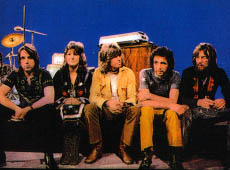
Week of February 15, 1997

'Stone The Crows!', shouted legendary manager Peter Grant, when he first heard this splendid young Scottish band roaring into action. Although it was the Londoner's favourite Cockney expression, he wasn't a man to be easily impressed. After all, he was the manager of Led Zeppelin, the most successful heavy rock band in history. Yet there was something earthy and appealing about the Crows that excited his enthusiasm and support.
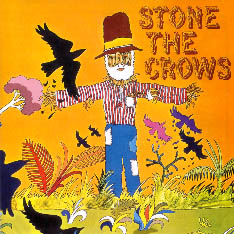 Rock
fans too were enthralled by the band, founded by guitarist Leslie Harvey
and featuring the passionate vocal style of dynamic singer
Maggie Bell. Their blues-based rock was imbued with
that extra power and authentic flavour that sprang from their tough Glasgowegian
roots.
Rock
fans too were enthralled by the band, founded by guitarist Leslie Harvey
and featuring the passionate vocal style of dynamic singer
Maggie Bell. Their blues-based rock was imbued with
that extra power and authentic flavour that sprang from their tough Glasgowegian
roots.
Every new group expects to conquer the world, and Stone The Crows were no exception. But Maggie Bell and Leslie Harvey had both been working long and hard before their latest venture finally took shape, way back in 1969. They deserved the success that finally came their way.
As teenagers Maggie and Leslie had worked together in a local group. Maggie (born Glasgow, January 12, 1945) came from a musical family who supported her ambitions. Leslie was the younger brother of singer Alex Harvey who led the Sensational Alex Harvey Band (SAHB).
Maggie was just 17 years old when she started singing professionally in the
city’s
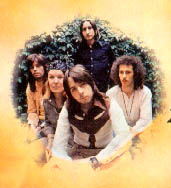 Locarno
Ballroom. Maggie soon found herself earning œ70 a week singing pop hits
of the day under the spotlights. It was a much better life than earning a
pittance as a window dresser. "It was big bucks!" remembers Maggie.
Locarno
Ballroom. Maggie soon found herself earning œ70 a week singing pop hits
of the day under the spotlights. It was a much better life than earning a
pittance as a window dresser. "It was big bucks!" remembers Maggie.
"I used to sing with a 15 piece big band on a revolving stage, and as the stage came round for the second set, there would be a rock band playing. I didn't really dig singing all the Shirley Bassey and Dionne Warwick songs, so after a year and a half I went over and joined the rock band!"
In 1967 Maggie teamed up with a couple of brass players, Bill and Bobby Patrick, for a tour of American airforce bases in Germany. "It was hard work and we played five hours a night, seven nights a week. But it was a great experience and helped me to get my music together and learn my craft. I stayed there for two years."
The guitar player in the band was her old mate Leslie Harvey. "We'd met even before I sang at the Locarno. He had a group called the Kenning Park Ramblers. That was in the days when his older brother Alex was doing the Star Club in Hamburg. Leslie was just a youngster like myself and we used to go to all these far away, obscure gigs around Scotland.
Anyway we all went to Germany and earned enough to buy ourselves a reel to reel Revox tape recorder!" The assassination of Martin Luther King in America led to a tense situation on all the U.S. bases and foreigners found themselves 'off limits.' The musicians returned to Scotland and the scene was set for the formation of a new band that eventually became Stone The Crows.
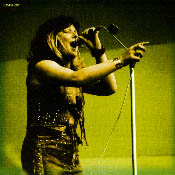 In 1968
Maggie and Leslie formed Power, which became a regular attraction at the
Burns Howff bar in Glasgow. "We heard about a couple of guys who were really
good musicians. John McGinnis was the keyboard player and Jimmy Dewar was
bass player and singer. He later went to work with Robin Trower when
he left Stone The Crows."
In 1968
Maggie and Leslie formed Power, which became a regular attraction at the
Burns Howff bar in Glasgow. "We heard about a couple of guys who were really
good musicians. John McGinnis was the keyboard player and Jimmy Dewar was
bass player and singer. He later went to work with Robin Trower when
he left Stone The Crows."
Leslie and Maggie went along to join in a Saturday afternoon session at the Burns Howff with John and Jimmy. It went so well they decided to form a group together. Power was an instant success and this set up lasted quite a while as Maggie, Leslie, John and Jimmy gained a strong local following.
Then Leslie was invited to tour America with another Scots outfit called Cartoone, when their guitar player dropped out at the last minute. Leslie was brought in by manager Mark London and spent two months touring the States. During his trip he jammed with The Allman Brothers band and his whole musical perspective was altered. Remembers Maggie: "He came back a totally different person, with long hair and little John Lennon glasses and a fringed suede jacket. He had a new stratocaster too!"
Leslie sat down with his old friends and told them they should stop playing 'covers' at the Burns Howff and start to write their own songs. "That's when we all started to write music. We changed everything from our look to our politics." Mark London then announced he wanted to bring Peter Grant up to hear them.
"Led Zeppelin were just starting to happen. Peter came up in a big limo with his partner Richard Cole. Peter liked what he heard but I found out later they didn't really know if I could sing. The band had been so loud they couldn't hear me at the gig. When I opened up my mouth in the studio that night they all come over and said ‘Fabulous voice!’"
In late 1969 Peter and Mark London signed Power and became their managers.
At the same time the band changed its name to Stone The Crows
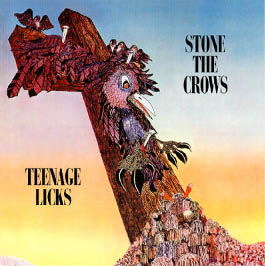 and
brought in drummer Colin Allen (Ex- Zoot Money's Big Roll Band and
John Mayall’s Bluesbreakers).
and
brought in drummer Colin Allen (Ex- Zoot Money's Big Roll Band and
John Mayall’s Bluesbreakers).
"Peter picked our new name. When he said: 'Cor blimey, stone the crows' we thought - what a name! But it stuck and people remember it." 'Stone The Crows' (Polydor) was produced by Mark London and released in 1970. Jimmy Dewar shared some vocal duties with Maggie and co-wrote the material. "We recorded the album in Advision studios, London, with Jimmy Dewar and John McGinnis. Jimmy was a great singer and he sounded a bit like David Clayton Thomas of Blood, Sweat & Tears. We shared the vocals on that album and we made a great team."
One of their first collective pieces was opening cut 'The Touch Of Your Loving Hand.' Says Maggie: "That was a really melodic piece and could have been done by a big band. It's a song that could still be performed today and wouldn't seem out of place. It was done in the style of Ray Charles or Roberta Flack. There is a great guitar solo on this by Leslie." 'Raining In Your Heart' was by Jimmy Dewar and it was quite an up tempo thing with lots of breaks and cymbal crashes."
Most of the album material was a regular part of their stage set including the bluesy 'Blind Man.' Maggie re-recorded this in November, 1996 during sessions for the 'History Of The British Blues' an album produced by Pete Brown. Jack Bruce, Peter Green, Mick Taylor and Big Jim Sullivan are all on the album intended as a tribute to the late blues harp player Cyril Davies.
Says Maggie: 'Blind Man' is a traditional song that Josh White used to perform. It's a real blues song. One of the reasons I got into black music was from listening to Josh White."
Another 'cover' on 'Stone The Crows' is The Beatles' 'Fool On The Hill' and explains Maggie: "I always wanted to do this because it's got great lyrics. We didn't really do it like the Beatles but I remember Petula Clark once said it was the finest version she'd ever heard!"
'I Saw America' is a massive epic that covered side two of the original vinyl album. It was born out of the band's first trip to America and was intended as a tribute to that great country. Some U.S. record executive however thought it was a rather odd idea.
Maggie: "It's in four parts and starts off with the different States we visited, from the Deep South to California. Musically we tried to describe how we felt about the different places. It's like a musical travelogue! Other members of the band had been to the States before, but it was my first trip. It was a strange situation though, because the American record people said: ‘but why do you want to write a song about America?’ They seemed to think only Americans should write about their country!"
Album sales weren't huge but as Maggie says: "It did all right and enabled us to make another couple of albums."
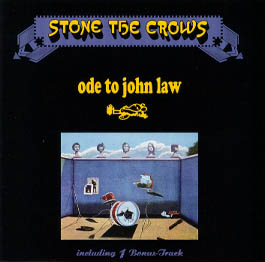 After
their second effort 'Ode To John Law' (1970), John McGinnis and Jimmy
Dewar quit and were replaced by Steve Thompson (bass) and Ronnie Leahy
(keyboards).
After
their second effort 'Ode To John Law' (1970), John McGinnis and Jimmy
Dewar quit and were replaced by Steve Thompson (bass) and Ronnie Leahy
(keyboards).
The next album 'Teenage Licks' (1971), proved to be their most successful and from then on Stone The Crows played all the major rock festivals. Maggie won the Best Female Vocalist award in the annual Melody Maker readers poll and with her raunchy, sincere style she was hailed by many critics as the natural successor to Janis Joplin. Things were looking good, then just when it seemed international stardom beckoned, Leslie Harvey was electrocuted and died on stage, before a gig at Swansea's Top Rank Ballroom. It happened during a sound check when Les touched a 'live' mike and his guitar at the same time. The band were devastated and never really recovered from the blow. But for the moment, they decided to carry on.
Peter Green from
Fleetwood Mac was
a possible replacement. He spent some time rehearsing with them for a major
rock festival. Two days before the show he rang to say he couldn't make it.
Steve Howe of Yes helped out, then another young Scottish guitarist,
Jimmy Mcculloch came in to help finish off the fourth album 'Ontinuous
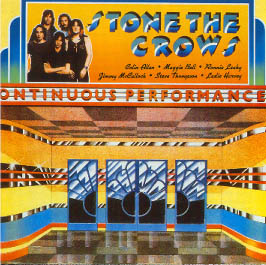 Performance'
(1972). Jimmy did his best but the heart had gone out of the group, and they
finally broke up in 1973. Jimmy went on to play with Paul McCartney's
Wings while Colin Allen, their drummer, joined Focus.
Maggie released two well received solo albums produced by Jerry Wexler,
'Queen Of The Night,'(1973), and 'Suicide Sal’ (1975).
Performance'
(1972). Jimmy did his best but the heart had gone out of the group, and they
finally broke up in 1973. Jimmy went on to play with Paul McCartney's
Wings while Colin Allen, their drummer, joined Focus.
Maggie released two well received solo albums produced by Jerry Wexler,
'Queen Of The Night,'(1973), and 'Suicide Sal’ (1975).
Maggie Bell now lives in Rotterdam, Holland, and is still singing and recording. In 1995 she did a tour of Scotland with the old Alex Harvey Band which went down a storm. She also toured with Chris Farlowe for three years. "I have been keeping busy. I could never give this business up!" She says.
"Stone The Crows were a great band and we had some wonderful times on the road. We toured with Roxy Music, David Bowie and Marc Bolan, and in the States we played alongside Frank Zappa, Edgar Winter and the MC5.
"Stone The Crows hadn’t really written anything before we did our first album, so I think our music was very good for the times. When you consider it was all done 25 years ago, it doesn't sound too bad!"
CHRIS WELCH, London, 1997
Taken from the Repertoire reissue of "Stone The Crows" (REP 4626-Y)
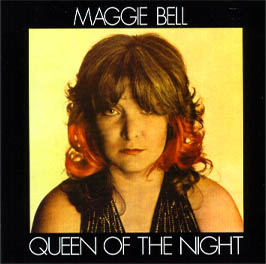
When Maggie Bell's group Stone The Crows
broke up in 1973 it was time for Britain's finest female singer to launch
her solo career. Since her earliest days in Glasgow, the Scots lass with
the soulful voice had been impressing audiences with her powerful and passionate
style. She was used to singing with bands, but now she was thrust into the
spotlight on her own. It meant more freedom, but more responsibilities, and
it wasn't always an easy task. She set to work on two albums (produced by
the legendary Jerry
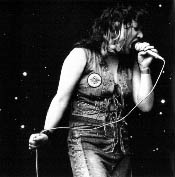 Wexler),
'Queen Of The Night' (1973) and 'Suicide Sal' (1975), both
now re-issued by Repertoire.
They gave her the chance to choose her favourite material and work with the
finest musicians. Among the artists on 'Queen Of The Night' were Reggie
Young and Cornell Dupree (lead guitars), John Hughey (pedal Steel) , Chuck
Rainey (bass) and Steve Gadd (drums). The Sweet Inspiration provided background
vocals. Critics and fans praised the results, and she set out on the road
to promote the albums. There would be some problems along the way, as Maggie
later discovered, but it was nothing she couldn't handle.
Wexler),
'Queen Of The Night' (1973) and 'Suicide Sal' (1975), both
now re-issued by Repertoire.
They gave her the chance to choose her favourite material and work with the
finest musicians. Among the artists on 'Queen Of The Night' were Reggie
Young and Cornell Dupree (lead guitars), John Hughey (pedal Steel) , Chuck
Rainey (bass) and Steve Gadd (drums). The Sweet Inspiration provided background
vocals. Critics and fans praised the results, and she set out on the road
to promote the albums. There would be some problems along the way, as Maggie
later discovered, but it was nothing she couldn't handle.
Maggie Bell was born in Glasgow (January 12, 1945) and came from a musical family. As a teenager she sang with local dance bands, then went to Germany in the mid-sixties to sing at US airforce bases. Returning to Scotland, she and the band's guitarist Leslie Harvey, formed a new group called Power which later became Stone The Crows. They were managed by Mark London and Peter Grant, the man behind Led Zeppelin. After Leslie was accidentally electrocuted on stage in 1972, the heart went out of the group. They worked for a while with fellow Scots guitarist Jimmy McCulloch, but broke up after a year. Explains Maggie: "When Leslie died, it was never the same. The band continued for a while, then we agreed it was the end of an era. Colin Allen, our drummer, was offered a job with Focus and Jimmy joined Wings. Meanwhile, Peter Grant and Mark London said they would help me to make a solo album.
The funny thing about 'Queen Of The Night' is that I made two previous albums for Atlantic in New York - one with Felix Pappalardi of Mountain and the other with Felix Cavaliere of the Young Rascals - which were never released." Maggie is frank about the reasons: "The record company said they weren't good enough. I was quite upset about that! To this day I believe it was wonderful stuff. I think it was down to a load of politics."
Luther Vandross did the vocal backings and there were many other top notch players involved with these projects. "But it wasn't to be and at this point Jerry Wexler stepped in. He told Atlantic, 'She can sing. I'd like to take over and see if I can make an album with her. And if you don't like it you can burn the tapes!' So we went ahead and made a good album. What more can I say? Jerry had worked with Aretha Franklin and Ray Charles. Just about everybody." Wexler and Bell sat down together and listened to over two hundred songs in the search for suitable material. "He's very meticulous about picking the right song. It was the most important time in my life musically. It was to be my first solo album and it had to be right! We got on very well socially and of course, he had worked with Lulu and Dusty Springfield as well. He said that he couldn't believe how when some people get a chance to make an album they really dedicate themselves, while others couldn't care less. Jerry tells everyone to do their homework, including the musicians and arrangers, and that it makes it better for everyone. I learned all the lyrics before I went into the studio. No pieces of paper allowed! He said that's what made Aretha Franklin and Tina Turner so great. They really learned their songs. If you read from cue sheets it detracts from the music. You have to learn your craft." Maggie spent two months preparing the eleven songs on 'Queen Of The Night' before the first note was sung in the studio. The album kicks off in fine style with 'Caddo Queen' which has a real Confederate rock flavour. One of the songs 'Oh, My My' was written by Ringo Starr and Maggie could have had a hit with her version - if Ringo hadn't brought out his own a week earlier. (It got to Number Five in the US chart in March, 1974.) The title song was written by Ronnie Leahy, the keyboard player with Stone The Crows. "I always had it in mind to do that song," says Maggie.
"‘Trade Winds’ was another great song that has been covered
by many people after I
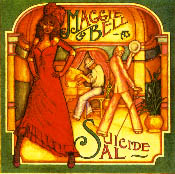 did
it, including Randy Crawford. It was written by Ralph McDonald, one
of the finest percussion players in America."
did
it, including Randy Crawford. It was written by Ralph McDonald, one
of the finest percussion players in America."
Another one of her favourites is 'A Woman Left Lonely.' "That's a real woman's song and it was also covered by Rita Coolidge. It's a country and western thing, a style I'd never done before in my life."
Maggie has always loved John Prine's music and she aired his composition 'Souvenirs' hotly pursued by J.J.Cale's 'After Midnight', a song also associated with Eric Clapton. "We did a Latin American treatment on our version with lots of percussion. 'The Other Side' was done in a kind of Mae West style. 'Hey Mister - can you help me! I'm looking for a ride over to the other side.' It's got a very American, razzmatazz feel."
After all her hard work Maggie was rewarded by rave reviews. "It was wonderful. People like Bette Midler said it was the best solo album from a female artist she'd ever heard, and it got great notices in the American magazines. There was even an article about me in Time Magazine! The record got to Number Ten in the charts, so it did really well." She put a new band together with Joe Jammer from Chicago and did a couple of tours of the States joined by Thunder Thighs, who did the 'doop de doops' on Lou Reed's 'Take A Walk On The Wild Side.'
"Everyone thought they were three black American girls, but one was Jewish, one was Irish and the other was English - from Shepherds Bush! They were a great bunch of girls and it was one of the best tours I'd done in my life."
Maggie remembers doing some dates with Earth, Wind & Fire in the Deep South, when the group were at the height of their fame. "I had to open the show and the audiences were all sitting there with their mouths hanging open and doing nuthin'." She hit on an idea to break down their resistance and asked her road manager to make a wooden screen. "I told him that I wanted to sing the first song behind the screen and then come on stage just to see what the response was like. Well, the response was unbelievable! You see they couldn't accept a white woman from Scotland singing the blues. 'Scotland? Where's Scotland - is that near Alaska?' But we used the screen and then it was OK - ha, ha!" Maggie Bell toured Germany in 1975 to promote 'Queen Of The Night' and the response was so good she was encouraged to record her second excellent album 'Suicide Sal'. After some years of touring she settled down with her family and concentrated on acting roles and writing music for films and TV during the Eighties. In recent times she has returned to the road, working with the old Alex Harvey Band and also singing alongside veteran soul man Chris Farlowe. "I like to keep busy," says Maggie. "I could never give this business up!"
CHRIS WELCH, London, 1997
Taken from the Repertoire reissue of "Queen of the
Night" (REP 4661-Y)
Stone the Crows 1969 Ode to John Law 1970 Teenage Licks 1971 'Ontinuous Performance 1972
Queen of the Night 1974 Suicide Sal 1975